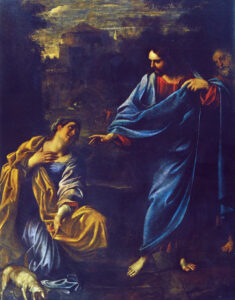Mercy that Excludes No One
 Did you ever think about whether Jesus knew that his mission was not limited to the Jewish people? I had not really thought much about it, having grown up as a member of the Church. Then one day, I read the story of what happened when Jesus went across the border into an area which was not historically nor actually at that time a part of the kingdom of Israel. The area in question was around the cities of Tyre and Sidon, on the Mediterranean Sea north of Israel.
Did you ever think about whether Jesus knew that his mission was not limited to the Jewish people? I had not really thought much about it, having grown up as a member of the Church. Then one day, I read the story of what happened when Jesus went across the border into an area which was not historically nor actually at that time a part of the kingdom of Israel. The area in question was around the cities of Tyre and Sidon, on the Mediterranean Sea north of Israel.
Jesus’ reputation as a healer preceded him. A woman from that area came to where he was. She was a Canaanite, one of the traditional enemies of the Israelites. She came to ask him to heal her daughter, who was being tormented by a demon. Today we would say she had a mental illness.
Jesus simply ignored her. He did not even respond negatively. Just silence. As if she didn’t even exist. She was a woman and a foreigner. No concern of his.
His disciples were irritated with her. She kept calling after them, requesting healing for her child. They asked him to send her away. “I was sent only to the lost sheep of the house of Israel,” was his response.
But she was persistent. She bowed before him and begged, “Lord, help me.”
We often think of Jesus as a kind, patient, polite man, but this time he was just plain rude. “It is not right to take the food of the children and throw it to the dogs!” Pretty clear who was being compared to a dog.
This mother did not let that insult stop her. She was desperate for healing for her child. “Please, Lord, for even the dogs eat the scraps that fall from the table of their masters.”
This brought an insight to Jesus. Healing could be for those who had faith. It is not limited to any religious or ethnic group. “O, woman, great is your faith! Let it be done for you as you wish.” The child was healed and Jesus learned an important lesson about God’s mercy and his mission. No one is to be excluded who comes in faith. (Mt 15:21-28)
This was not actually a new idea in Judaism. Isaiah spoke of a similar idea to the folks who had returned from exile in Babylon. Their temple had been rebuilt and now it was possible to offer sacrifice there again. But what about all the time away and the time before the temple was rebuilt? How had it been possible to keep the sabbath holy and to maintain the covenant with the Lord if temple sacrifice could not be offered?
The Lord, through his prophet, told them to take notice of what is right and just. Watch and see how the Lord’s justice is revealed. It is revealed as foreigners join themselves to the Lord and become his servants. All who keep the sabbath and hold on to the covenant will be welcomed to the holy mountain of the Lord. Their sacrifices offered on the altar will be as valid as those of the original community. The Lord’s house is “a house of prayer for all peoples.” No one will be excluded from his mercy. (Is 56:1, 6-7)
St. Paul expresses the community’s understanding of the Lord’s call in his letter to the Romans. He speaks of himself as “the apostle to the Gentiles.” He has been sent to spread the message of God’s love and mercy beyond the Jewish community into the entire world. If the people of Israel had welcomed Jesus with open arms and become his followers, it’s quite possible that the faith would not have expanded out to include everyone. Paul says that in their refusal to believe, their disobedience, his own people had made it possible for Gentiles, all the other peoples of the world, to receive the Lord’s mercy and love. No one is to be excluded. (Rom 11:13-15, 29-32)
As our communities divide into camps with opposing ideas these days, I believe we are again called to ask ourselves if we are truly willing to accept each other and wish each other well. Are we sisters and brothers in the Lord? Are we sisters and brothers, children of one creator. Are we equally loved and forgiven for our small mindedness and smug self-confidence. Too often we say, “I know what is right and you are totally wrong!”
In religious circles, it is especially important to be patient and loving with each other. We may not agree on all topics. Some will be more open to changes in social standards and structures than others. Some may interpret Scripture more literally than others. Some will distrust the findings of social or physical sciences. However, all are children of the same Father, who calls all to mercy and mutual forgiveness.
How do we keep from being a community that turns in on itself when confronted with others who have different experiences of God’s presence and love? How do we remain open and welcoming? Is it by condemning those whose ways are different from ours? Or by setting up rules and regulations to restrict access to the Eucharist and sacraments? Or do we recognize that God is bigger than all of our rules and categories. God loves all of creation and especially all people. He did, after all, according to our very ancient tradition, create us in his own image and likeness,. If that is truly the case, then we are called, like Jesus himself, to be open to those whose ways are different from our own. We are called to offer healing and reconciliation in and between communities. We are called to let the power and unrestricted love of our Father flow out through us to heal those who are suffering, physically, socially, mentally, spiritually.
God’s mercy excludes no one. So we must not exclude others either. Instead, we come together in prayer and Eucharistic thanksgiving to remember and be nourished. Then we go forth into our world and share the graces and blessings received as we allow the love of God to flow out in healing mercy through us.
This week, let’s focus on seeing the goodness and mercy of God in our families, our neighbors, our communities, and our world. All are welcomed in the Kingdom of God and all receive the merciful love of our Father.
Readings for the Twentieth Sunday in Ordinary Time – Cycle A










